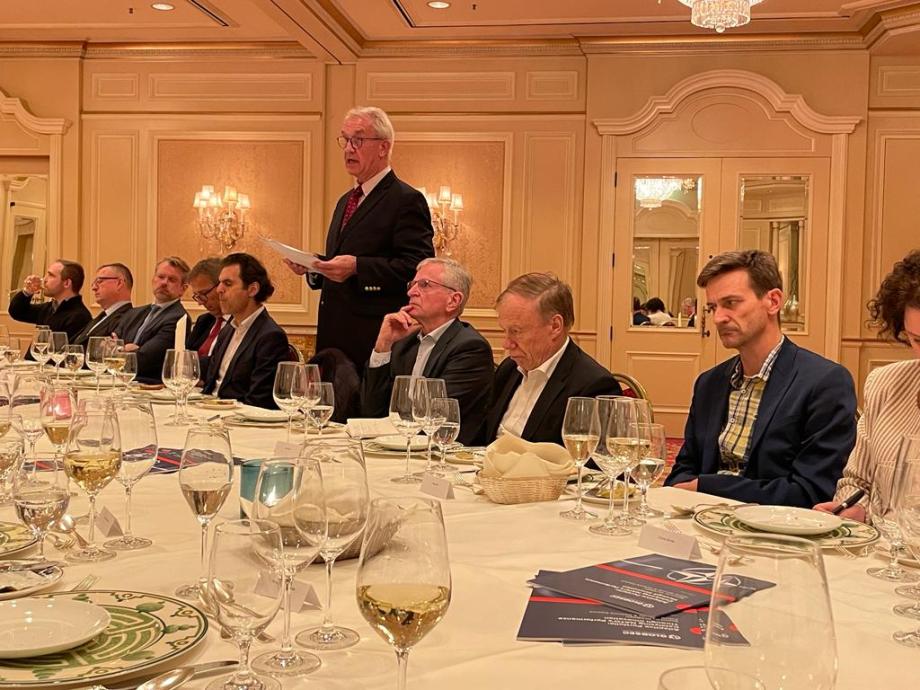FSDC Dinner Briefing in Berlin: Key Takeaways by Admiral Manfred Nielson

As part of the Future Security & Defence Council (FSDC) project aiming to support NATO’s ongoing defence innovation work by portraying key elements of a future NATO Defence Innovation Ecosystem, GLOBSEC hosted another dinner briefing, this time in Berlin. The goal was to present the project and the outcomes and recommendations of the final report: “Adaptive Portfolio: Catalysing NATO’s Performance Through Innovation”.
This time, the discussion focused more on the practical aspects and the closer link between the industry and the state sector. The briefing was attended by representatives of the state and private sectors, think-tank experts, and the media. Over the dinner, various views and insights, comments on the current security situation, and possible developments for the near future were exchanged.
FSDC members Marcel Grisnigt and Admiral Manfred Nielson started the discussion and presented the outcomes of the FSDC project to the audience.
Read below the key messages delivered by Adm Manfred Nielson, former Deputy ACT, NATO:
- The fighting capabilities of Ukraine are higher than anticipated, with key factors being innovation, inventiveness, and adaptability, as well as a remarkable willingness to fight the aggressor. The Alliance should learn from this approach and adapt its policies accordingly.
- The crucial factor in converting partial victories and territorial gains into a definitive victory is the continuous and unwavering support of Western allies, namely the US and EU. While they fight on behalf of our shared values, we need to support this effort and explain what is at stake to a general public hit by economic turmoil. Russia’s objective is to pressure the European population in order to cause a call for the loosening of sanctions.
- We are now observing a paradigm shift endangering the very fundamentals of democracy, free speech, and liberal values. It is up to all nations to guard those and stand against their challengers across the globe. There is a need for the “Liberal Aligned Nations” to protect their economic interests, which are tightly tied to the security challenges we are currently facing, emphasising innovation, which should be the driving force behind securing our economic interests.
- NATO is behind in terms of its capabilities in the rising geo-economic competition. Direct action is required in investment and innovation, and NATO should proactively seek to prioritise these areas. The increase in our strategic capabilities and innovation mechanisms is necessary in order to equal those of our competitors.
- NATO’s ability to catalyse its performance through innovation will be critical for its political leadership’s credibility, its military organisation’s effectiveness and interoperability, and its industrial ability to reliably deliver the Alliance a technological edge into the foreseeable future. Three forces driving adaptation needs throughout NATO are systemic competition, increasingly fierce geo-economic rivalry, and the growing divergence of priorities among alliance members.
- Systemic competition is a representation of a paradigm shift. The dividing line is now between democratic and autocratic regimes, each advocating for different handlings of geopolitical interests, the former prioritising multi-lateral solutions, with the latter relying on unilateral power.
- The rise of geo-economics is represented by the growing importance and continuous securitisation of strategic economic flows, such as energies, infrastructure, and cyberspace. These factors continue to present crucial factors in conflicts and should be the priority of our investments and focus.
- We are observing a divergence of the inter-alliance consensus over strategic priorities. The two previous factors cause misalignment and division over the approaches taken by the individual members of the Alliance, thus weakening our capabilities for strategic cooperation. These should be erased and unified.
- The adaptation portfolio proposes five means of action for NATO to increase its innovation capabilities:
- Grounding defence innovation on economic security;
- Advocating what kind of innovation it wants and needs;
- NATO’s innovation work needs to be underpinned by a resilient innovation ecosystem;
- Innovation work must provide tangible results to military end-users;
- NATO needs to change the way it does defence innovation business to garner persistent support.